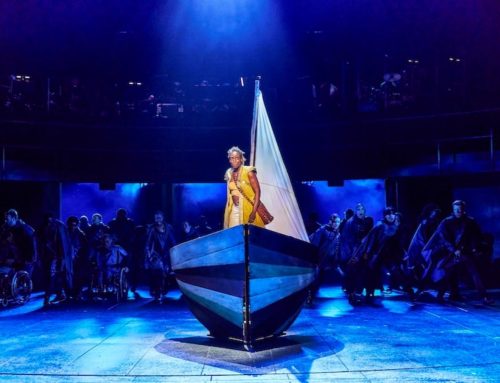As an exploration of a killer’s mind ‘The Father and The Assassin’ disappoints. As history lesson it packs a hefty punch.
19 May 2022
Writer Anupama Chandrasekhar has two interwoven tasks in The Father and The Assassin. Firstly, to lay out the political and historical events that led up to the vicious 1948 assassination of Mahatma Gandhi. Secondly, to speculate on the psychological motivations that drove Gandhi’s assassin, Nathuram Godse, to murder the man many Indians label ‘the father of the nation’.
In the former task Chandrasekhar, broadly-speaking and notwithstanding a surfeit of awkward exposition and questionable dramatic licence, succeeds. In the latter, despite Shubham Saraf’s superb performance as Godse, she left me unconvinced.
The assassin’s life story is certainly packed with dramatic potential.
Fathered by a poor rural postman who believed his male offspring were cursed to die, Godse’s early childhood years was spent brought up as a girl, whose supposed medium-like ability to communicate with spirits is ruthlessness hawked for cash to guileless neighbours.
Chandrasekhar sees him growing up convinced of his own uniqueness, side-by-side with two younger friends, one of whom, Aai, is later to reappear throughout the play as a jokily self-referential narrative device.
In one of a number highly dubious pieces of historical license, we are then asked to believe that it is a chance encounter between Gandhi and the juvenile Godse that empowers him to throw off his girlish garb and reveal his true inner boy. Thus, we have a convenient backstory to explain Godse’s mixed up emotions towards the father-figure the Mahatma Gandhi was to become.
Sent later to an English-language high school in Pune, the writer sees Godse’s actions inadvertently leading to the unwarranted arrest, and later death at British hands, of the school gatekeeper. I suspect this may be yet more dramatic invention, but dramaturgically-speaking it is a convenient, if unwieldy way of explaining the assassin’s motivation to rid his nation of colonial oppressors.
Godse drops out of school to become a tailor, and thence falls into the clutches of extreme right-wing Hindu-nationalist firebrand Vinayak Savarkar, played with sinister charisma by Sagar Arya. The real-life Savarkar developed the proto-fascist political ideology of Hindutva, which argues for the hegemony of Hindus and Hinduism over other cultural identities in India.
Where the play works best is its recounting of how those arguing for a culturally pure Hindu identity would inevitably and brutally clash with Gandhi’s vision for a diverse and inclusive united India. The ultimate outcome was lethal for Gandhi, and, insomuch as it contributed to the 1948 partition and to India’s enduring challenge of inter-ethnic conflict, a bloody stain on the sub-continent’s history. It takes an awful lot of gawky exposition to get this narrative across, but it is a story worth hearing.
Where the play fails most is in the jarringly atonal characterisation of Godse, who is presented, at least in the first half, as an almost comically attractive figure.
Chandrasekhar has her character engage in fourth-wall-breaking banter with the front row and deliver a string more or less humorous quips and asides straight out at the auditorium. I suppose her aim was to show how alluring and enticing right-wing ideas can be. By inviting us to like him, she wants us to reflect on the seductions we might also stumble upon in the filth he spews out.
It takes a clever writer to pull off the presentation of otherwise despicable characters as utterly charming. House of Card’s psychotically amoral central character Frank Underwood being a good example.
Chandrasekhar writes some good lines, but unfortunately, she cannot quite pull the trick off and so ends up hiding more than she reveals. Trying to get a grasp on why a shy tailor became an assassin is just not aided by turning him into a comic turn from Slumdog Millionaire. At the end I really had little inkling of who Godse was, or a convincing psychological rationale for his actions.
Other things jar too. The real Godse’s life communicates a warning about what can happen when politicos set out to divide rather than unite. But for all its faults, a hard Brexit is not comparable to the partition of India and allowing an assassin to draw this contrast is just asinine.
Rajha Shakiry’s design deserves a mention. The backdrop, a gorgeous sackcloth whose threads are in the process of being woven together (or picked apart), neatly sums up how Godse’s and Gandhi’s lives become entwined. It also expresses how the fabric that held one nation together split apart into two different cords in 1948.
The set is comprised of machine-like tectonic plates, clashing and grinding against each other, lit with the rust-reds and bloody colour pallet of a Mughal emperor’s palace. It is great.
There is a lot to like here, but something about the tone is, just a little, off.
Writer Anupama Chandrasekhar
Director Indhu Rubasingham
Set and Costume Designer Rajha Shakiry
Vinayak Savarkar Sagar Arya
Ankur Bahl Madhav / Kishore / US Godse
Mohandas Gandhi Paul Bazely
Ralph Birtwell Ensemble / US Gandhi/Baba
Ayesha Dharker Aai
Marc Elliott Pandit Jawaharlal Nehru
Ravin J Ganatra Saradar Vallabhbhai Patel
Dinita Gohil Vimala
Halema Hussain Ensemble
Irvine Iqbal Mohammad Ali Jinnah
Nadeem Islam Mithun
Tony Jayawardena Baba
Sakuntala Ramanee Ensemble / US Aai
Anish Roy Ensemble / US Apte/Madhav/Kishore
Narayan Apte Sid Sagar
Shubham Saraf Nathuram Godse
Akshay Shah Ensemble / US Daulat/British Policeman/Kishen/Mithun/Jinnah
Peter Singh Daulat / British Policeman / US Savarkar
Maanuv Thiara Kishen / US Patel/Nehru
Duration: 2 hours 35 minutes. One interval.
Full Disclosure: I paid full box-office price for the ticket.
More Recent Reviews
Playfight. Soho Theatre.
Writer Julia Grogan’s breathtakingly assured debut play arrives at Soho Theatre following stellar reviews at the Edinburgh Fringe and [...]
All The Happy Things. Soho Theatre.
Naomi Denny’s three-hander comedy-drama All The Happy Things covers familiar themes within a recognisable premise. A grieving protagonist comes [...]
Telly. Bread and Roses Theatre.
The challenge with absurdist comedy is that many people do not find it funny. Laughing at the sheer weirdness [...]






